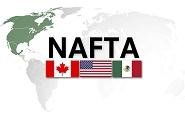Government/Policy

September 26, 2017
Rules of Origin on Agenda for NAFTA Talks
Written by Sandy Williams
U.S. content in NAFTA automobiles is shrinking and contributing to the trade deficit America has with Canada and Mexico, according to Secretary of Commerce Wilbur Ross.
In an editorial for the Washington Post, Ross cites a new study analyzing data from 1995 to 2011 that indicates U.S.-produced content in manufactured goods imported from Canada fell from 21 percent to 15 percent during the 16-year period. An even more dramatic decline was observed in goods imported from Mexico, from 26 percent in 1995 to 16 percent in 2011. Ross said there is no reason to think the situation has improved.
The U.S. content in automobiles from Canada and Mexico follows a similar pattern. Automotive imports account for 27 percent of total imports from the two countries and are driving the U.S. trade deficit with its NAFTA partners, claimed Ross.
Even more troubling, he added, is that much of the previous U.S. share of content is being absorbed by non-NAFTA trading partners. Non-NAFTA content in imports from Canada rose from 12 percent to 21 percent and from Mexico 14 percent to 27 percent.
The declining share of U.S content in NAFTA imports puts hundreds of thousands of American manufacturing jobs at risk, said Ross. In the past, Ross has referred to NAFTA’s rules of origin as a “back door” for Chinese and other foreign auto parts to enter the U.S. “These data debunk the claim that U.S. content in the form of parts is so high that we shouldn’t worry about headline gross-deficit figures,” he said.
Raising the total NAFTA content requirement and raising the U.S. share of that requirement is a major objective for the U.S. in its renegotiations of the NAFTA agreement, said Ross. Currently, to avoid duties within NAFTA, automobiles must have 62.5 percent North American content.
Commented Ross, “If we don’t fix the rules of origin, negotiations on the rest of the agreement will fail to meaningfully shift the trade imbalance. Our nation’s ballooning trade deficit has gutted American manufacturing, killed jobs and sapped our wealth. That is going to change under President Trump, and rules of origin are just the beginning.”
So far, no progress has been made on the issue. Canada’s chief negotiator Steve Verhuel told reporters that the U.S. did not lay out specific details on the origin rules during the first two rounds of talks and he was “not expecting to see anything radically new” proposed during the third round, particularly in regards to the auto industry.
The economic minister of Mexico has called automotive rules of origin one of the “elephants in the room” during NAFTA discussions.
President Trump has repeatedly vowed to withdraw from NAFTA if a better deal cannot be agreed on for the United States.







